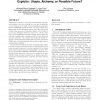Free Online Productivity Tools
i2Speak
i2Symbol
i2OCR
iTex2Img
iWeb2Print
iWeb2Shot
i2Type
iPdf2Split
iPdf2Merge
i2Bopomofo
i2Arabic
i2Style
i2Image
i2PDF
iLatex2Rtf
Sci2ools
CCS
2015
ACM
2015
ACM
Securing Legacy Software against Real-World Code-Reuse Exploits: Utopia, Alchemy, or Possible Future?
Exploitation of memory-corruption vulnerabilities in widelyused software has been a threat for over two decades and no end seems to be in sight. Since performance and backwards compatibility trump security concerns, popular programs such as web browsers, servers, and office suites still contain large amounts of untrusted legacy code written in error-prone languages such as C and C++. At the same time, modern exploits are evolving quickly and routinely incorporate sophisticated techniques such as code reuse and memory disclosure. As a result, they bypass all widely deployed countermeasures including data execution prevention (DEP) and code randomization such as address space layout randomization (ASLR). The good news is that the security community has recently introduced several promising prototype defenses that offer a more principled response to modern exploits. Even though these solutions have improved substantially over time, they are not perfect and weaknesses that allow bypasses...
| Added | 17 Apr 2016 |
| Updated | 17 Apr 2016 |
| Type | Journal |
| Year | 2015 |
| Where | CCS |
| Authors | Ahmad-Reza Sadeghi, Lucas Davi, Per Larsen |
Comments (0)

